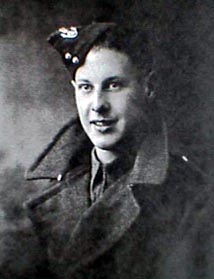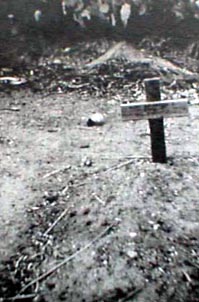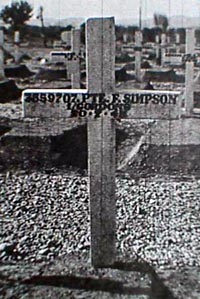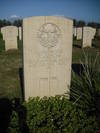










































In Memory of
SIMPSON, FRED
Private, 3859707
Gordon Highlanders
1st Bn
who dead age 27
on 20th July 1943
CATANIA WAR CEMETERY, SICILY

Fred Simpson, note the Loyal North Lancs cap badge.
Fred was the youngest son of George and Mary Simpson, Soutergate, Kirkby-in-Furness, Lancashire, according to Roger Rushton, who is researching Kirkby casualties, Mrs Simpson was a widow when her son was killed. George Simpson, who worked for the railway on Kirkby station, died in 1918. Their house does not now exist. Fred was in farm service prior to WW II, living with his sister Eleanor, wife of Joseph Pattinson at Broughton Grove Farm, Field Broughton John Pattinson). Fred suffered from asthma, so he left Field Broughton just prior to the outbreak of war as farm work intensified his illness.
Joseph's daughter, Mrs. Winnie Edmondson, remembers her uncle well, being only 12 years his junior. She thinks he went to Preston on being conscripted and joined the Loyal North Lancashire Regiment, being transferred to the Gordons later. She has a letter from Fred's C.O. to his mother saying, "It was such tremendously bad luck that, having survived the Battle of North Africa, he should lose his life so early in a new campaign. You will be glad to hear that he suffered no pain but was killed outright. Like all these lads he was a hero and died doing his duty. In and out of action he was a fine man and a friend to all his comrades." She also has Fred's campaign medals and the photographs reproduced here, also a sad and touching letter from a friend from home, Sgt. Bill Smith, who visited his grave in early October, 1943. He described the location and mentions taking the photograph below. His grief is palpable,"... and the agony of my sorrow overtook me, and I got down beside the head of his grave and murmured a prayer."
Axis forces in North Africa were finally defeated in May 1943, but the plan for the invasion of Sicily was only completed on May 13th. A landing shortly after the African collapse would have caught the island virtually defenceless. Despite Churchill's pressure the Mediterranean command insisted that no invasion was possible before 10th July 1943, allowing Axis forces far too much time to reinforce their defences. It was decided that landings would take place on the south-east of the island. The conquest of Sicily involved 250,000 British troops and 228, 000 Americans.
The 51st (Highland) Division were brought from Tunisia, some staging in Malta, the Italian coastal defenders were easily overcome, with the south-eastern part of the island being occupied within the first three days.
Montgomery decided to break out into the Plain of Catania from the Lentini area and ordered an attack on the night of July 13th. Paratroopers were dropped to take Primasole bridge over the River Simeto, only half the Brigade landed in the right place. They took the bridge but it was retaken by the Germans on the 14th. The main British force only succeeded in capturing it after three days of stiff fighting. They attempted to press on to the north, but German reserves concentrated on the direct coastal route to Messina, and dashed hopes of a quick victory. 8th Army were forced inland, into the area around Mt. Etna where, at about 2 pm on the 19th, orders were received by 1st Gordon Highlanders (153rd Brigade) for a new attack - to pass through the Black Watch, take Sferro village and send two companies to Point 151; A and B Companies of 5/7 Gordons would also be under command.
The 1st Gordons were exposed on a hot hillside all day on the 19th, due to a delay in establishing the Sferro bridgehead. The Black Watch were in a river bed (Wadi to the 8th Army veterans) - passing through them, clambering up the far bank and forming up would take longer than planned, but the CO was able to delay the supporting barrage for half an hour, until 11:30 pm.
The enemy barrage caught the attackers as they advanced. B and C Companies, 1st Gordons, attacked under heavy fire, reached the road and advanced 300 yards beyond. A and D Companies followed up. The railway station was taken and headquarters established. The attack on Point 151 was postponed because of the lateness of the hour. A and B Companies of 5/7th Gordons on the right of the road had forced their way into Sferro village and confused fighting followed. The Germans counterattacked at daybreak, but 5/7th bravely held on, aided by the appearance of a troop of Sherman tanks; the enemy withdrew.
This action saw Captain J.W. Ritchie add a Bar to his Military Cross, by driving an ammunition truck across the mined and artillery pinpointed bridge into Sferro. James Ritchie died in February 1999, aged 78.
A Company of 1st Gordons was held ready for a counterattack into the village, should it be needed. B and C Companies beat off a counterattack at 2 am.
On the 20th the Germans maintained a heavy bombardment of the bridge-head. Movement was very difficult, but the barrage slackened a little in the afternoon, when 1st Gordons' front companies moved forward a few hundred yards. When night fell both battalions busied themselves strengthening the position and the mortar platoon of 1st Gordons fired fifty rounds into an orchard. The position came under heavy fire next morning and with heat, flies and the impossibility of daytime movement without being shot at, 1st Gordons regarded this as, "one of the least pleasant billets occupied since the Battalion came abroad."
Fighting in this rugged countryside continued, with all sides being reinforced, until Sicily was finally cleared on August 17th.

Fred's grave near Sferro, photographed by his friend Bill Smith. |

The official photograph of his last resting place at Catania. |
From http://members.multimania.co.uk/aitch11/Fred_Simpson.html







